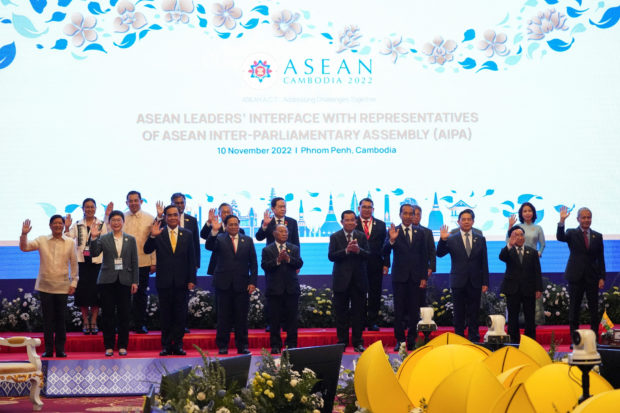Myanmar to dominate ASEAN agenda, but ‘little progress expected’

ASEAN leaders pose for a group picture as they meet with representatives of ASEAN Inter-Parliamentary Assembly (AIPA) during the ASEAN Summit in Phnom Penh, Cambodia November 10, 2022. (REUTERS)
PHNOM PENH – Myanmar’s escalating violence and political gridlock are expected to dominate an ASEAN leaders’ summit on Friday, as increasingly frustrated members of the regional bloc struggle to get the country’s junta to comply with an agreed peace plan.
Members of the Association of Southeast Asian Nations (ASEAN) have blamed Myanmar’s military rulers for failing to implement the peace plan agreed jointly last year, which includes ending hostilities and allowing access for a special envoy and aid.
Political, social and economic chaos have gripped Myanmar since the military overthrew an elected government led by Aung San Suu Kyi last year, led a deadly crackdown on dissidents and unravelled years of reform in the erstwhile fledgling democracy.
ASEAN, which has barred junta leaders from its meetings since last year, repeated last week its commitment to the so-called five-point peace consensus, but some members have urged a stronger stance.
The foreign ministry of Malaysia, which has by far been the most critical of the junta, said it would be “calling for a more decisive stance by ASEAN” at this week’s meeting.
Article continues after this advertisementIndonesia’s foreign minister last week said the junta, not ASEAN, was squarely responsible for a lack of progress on the peace plan and that recommendations would be made to leaders this week on strengthening its implementation.
Article continues after this advertisementMembers such as Singapore and the Philippines have simply urged dialogue and compliance with the peace plan.
The junta has blamed a lack of progress on the pandemic and obstruction from armed resistance movements that it calls terrorists.
James Crabtree, Executive Director of the International Institute for Strategic Studies-Asia, said ASEAN was struggling to cope with internal divisions over Myanmar and other issues.
“Whether it is Cambodia as chair now or Indonesia next year those divisions aren’t going to go away, and that is likely to continue to limit the bloc’s ability to pressure the junta in Myanmar or respond smartly to rising great power competition,” he said.
‘LITTLE PROGRESS EXPECTED’
The bloc, which has a long-standing tradition of non-interference in members’ sovereign affairs, has ruled out Western-style sanctions against Myanmar or expelling it from the 10-member group, even as it condemns increasingly violent actions by the junta such as the recent executions of democracy activists and an air strike that killed 50 civilians.
One Western diplomat who will attend the meeting said that, while the bloc may try to make the Myanmar peace plan more action-oriented, “little progress is expected”.
Cambodian Prime Minister and current ASEAN chair Hun Sen has repeatedly made overtures to Myanmar’s generals in the hope of getting them to cooperate. The efforts have produce “limited achievement”, acknowledged Kao Kim Hourn, a senior Cambodian government official and advisor to Hun Sen.
But he added: “At the end of the day, without ASEAN intervention, Myanmar could be far worse.”
World leaders who have condemned and sanctioned the junta, including U.S. President Joe Biden, will be in attendance, as will friendlier nations to Myanmar such as Russia and China, represented by Foreign Minister Sergei Lavrov and Premier Li Keqiang respectively.
Officials expect this week’s summit to be a difficult one, with discussions also expected to include the war in Ukraine and regional tensions over the South China Sea, Taiwan and North Korea.